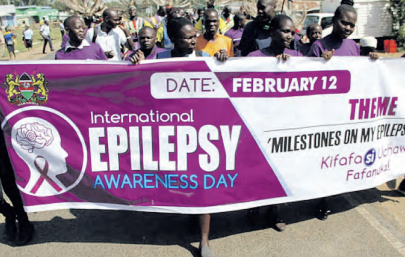
Shortage of drugs and stigma are some of the challenges that epileptic patients in Homa Bay are still facing as they manage the condition.
Epilepsy is characterised by seizures and convulsions, which make patients lose stability and fall involuntarily.
The condition affects the brain, causing nerve cells to not signal properly.
It has no cure. Treatment is also costly and patients are forced to put up with stigmatisation.
Speaking when they marked this year’s World Epilepsy Day at Marindi Hospital in Homa Bay town, Levina Magambo and David Ouma said some drugs are not accessible and others are expensive.
Magambo spends up to Sh7,200 monthly to access the recommended medicine.
“I spend money I earn to buy drugs in Kisumu. It is uneconomical because it forces me to travel from Homa Bay to Kisumu to get the medicine,” Magambo said.
Most of them are rejected by the public because of myths surrounding the disease. Ouma was diagnosed with the condition in 2018.
Unable to bear discriminatory remarks, including he and his family being accused of being sorcerers, Ouma dropped out of school.
“Some neighbours never wanted me near them as they thought I would infect them. My parents were also taking me to clerics to cast out the devil instead of taking me to the hospital,” he said.
In Homa Bay, most patients depend on Médecins Sans Frontières to get drugs. MSF offers medicine for free from Marindi and Nyalkinyi subcounty hospitals, where most of the patients go for support.
Ben Otieno, the medical officer at Homa Bay subcounty says epilepsy can be congenital, meaning it can be acquired at birth.
“It can be hereditary and passed from parents to their children. It can come at any stage in life,” Otieno said.
Other causes of epilepsy include head injury. The condition can be managed by taking medicine.
MSF project coordinator, Bright Mukhuna, said people suffering from epilepsy face several barriers when they want to access treatment.
“Most of them are having pain because they are sidelined and struggle to get education and employment,” Mukhuna said.
MSF supports up to 190 patients who collect drugs for managing the condition.
The organisation is also pushing for decentralisation of treatment to enable patients access drugs with ease.
“We are working toward introducing other drugs to save patients from
spending a lot of money in buying
medication,” he said.

